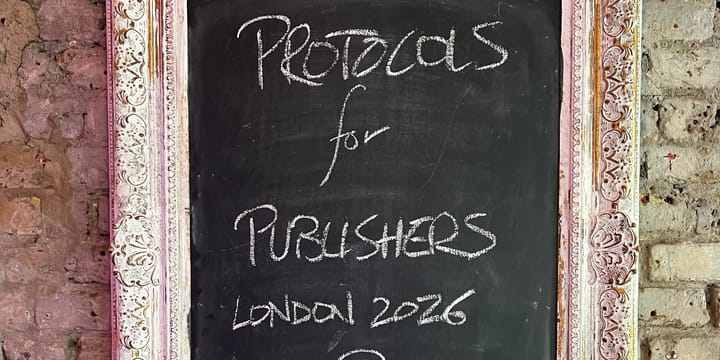Bluesky Adopts More Flexible Model for Content Moderation
By adopting a composable moderation system, Bluesky makes space for plural moderation without forcing smaller players to run their own servers.

By Mallory Knodel
Sometimes, letters work. Earlier this summer, alongside Martin Husovec and Daphne Keller, I submitted comments to Bluesky about its approach to trust and safety. We argued that for the AT Protocol to deliver on its promise of an open social web, content moderation must be designed in a way that empowers users and communities to set their own content moderation standards.
How we believe moderation should work on the AT Protocol
In a federated network like Bluesky, each user account (for example, @mallory.techpolicy.social.ap.brid.gy) is stored on a hosting provider called a Personal Data Server (PDS). Bluesky currently operates the largest of these, the bsky.social PDS, which hosts most user accounts today.
The way PDS providers respond to harmful or illegal content determines whether the network stays open and resilient. If every PDS simply deletes posts or accounts at the server level, that content disappears from the network entirely. Other apps and communities cannot decide for themselves how to handle it, and the only way they could preserve access would be to operate their own PDS. Running a PDS requires significant resources for storage, legal review, and compliance, which creates high barriers for smaller players. By contrast, if PDSes use labels instead of deletions, the underlying content remains visible across the network. Other services can then reuse that shared baseline and focus on applying their own rules, making it far cheaper and more practical for diverse moderation systems to exist.
Our recommendation was straightforward: limit true account takedowns at the PDS level to serious cases like illegal material or large-scale network abuse. For other violations, PDSes should apply strong labels, such as “!takedown,” that signal the problem without erasing the account entirely. We call this a composable moderation system: decisions are expressed as labels that different apps and communities can then interpret in their own way. One app might hide labeled accounts, another might warn users before showing them, and another might ignore the label altogether. Because moderation is layered and reusable, each community can “compose” the version that fits its needs.
Bluesky’s update
Last week, Paul Frazee, Bluesky’s co-founder and Chief Technology Officer, confirmed that this is the direction Bluesky will now pursue. He acknowledged that the system had unintentionally departed from this model and that Bluesky is course-correcting. It is encouraging to see Bluesky embrace the same principles we put forward: preserving user agency, reducing the cost of alternative moderation, and keeping the ecosystem open to innovation.
What this means for the open social web
By relying on labels rather than deletions, Bluesky lowers barriers for new moderation services and enables a pluralistic ecosystem. Communities can build on a shared base of content while applying their own rules and standards. That flexibility is what makes federation powerful, and it is critical for a healthy, open social web.
If this approach works, it could also inform how moderation evolves on other federated systems like ActivityPub. Today, Mastodon and ActivityPub moderation largely happens at the server level, through tools like account suspensions and defederation. A label-based system could allow servers to share signals about spam or abuse, while still letting each community decide how to act on them. Labels travel farther than deletions, and that portability makes diverse forms of moderation easier to build.
Open questions
We still have some questions. In his blog post, Paul Frazee explained that account takedowns at the PDS level will be limited to network abuse and illegal content, with other cases handled through strong labels like “!takedown.” That is encouraging, but we still wonder whether the same approach applies to individual posts. Are posts also labeled rather than deleted, and do they persist on the PDS for as long as the account exists?
Paul also noted that accounts removed from a PDS should still be able to migrate elsewhere. That principle makes sense, but it will need a stronger caveat for especially severe categories such as child sexual abuse material.
Even with these questions, the shift announced last week marks a meaningful step forward. It shows that advocacy grounded in technical and legal expertise can shape the infrastructure of tomorrow’s internet.
Bluestockings Cooperative Closing
After 26 years of serving as a radical feminist bookstore and community hub on New York’s Lower East Side, Bluestockings Cooperative has announced it will close at the end of 2025. The space has long been a refuge for queer, trans, sex worker, and other marginalised communities, offering books, events, and collective organizing in the face of systemic neglect and rising costs.
The news is devastating for those who have found belonging within its walls. At Exchange Point, we were honored to partner with Bluestockings earlier this year by curating a list of books. Bluestockings’ closure is a profound loss, not only for New York, but for the global networks of activists, the worker-stewards in the store who report being locked out of the decision-making process, and the readers and dreamers who looked to it as a beacon of radical imagination. We mourn this ending, while carrying forward the spirit of solidarity it nurtured.
Support the Internet Exchange
If you find our emails useful, consider becoming a paid subscriber! You'll get access to our members-only Signal community where we share ideas, discuss upcoming topics, and exchange links. Paid subscribers can also leave comments on posts and enjoy a warm, fuzzy feeling.
Not ready for a long-term commitment? You can always leave us a tip.
This Week's Links
Internet Governance
- IAB warns ICANN’s proposed Root Server governance model lacks detail on accountability and transparency, risking Internet stability without a clearer implementation plan. https://www.iab.org/announcements/iab-response-to-functional-model-for-root-server-system-governance
- The UN has launched a Global Dialogue on AI Governance, with a scientific panel and plans for a global AI capacity fund to ensure inclusive, rights-based oversight. Details on how to apply to join the panel below in “Opportunities to Get Involved”. https://www.un.org/sg/en/content/sg/statement/2025-09-25/secretary-generals-remarks-high-level-multi-stakeholder-informal-meeting-launch-the-global-dialogue-artificial-intelligence-governance-delivered
- Buried in the details of the TikTok agreement is a new control over digital media content that no one is noticing, says Milton Mueller. He warns it could reshape online expression for years to come. https://www.internetgovernance.org/2025/09/28/the-shocking-part-of-the-tiktok-settlement-that-no-ones-talking-about
- Cherokee Nation outlines AI, data, and cybersecurity recommendations to strengthen sovereignty and preserve culture while protecting citizens’ privacy. https://www.cherokee.org/media/0ipldvul/task-force-report-on-ai-data-sovereignty-cybersecurity.pdf
- The International AI Safety Report 2025 finds that general-purpose AI capabilities are advancing rapidly, and warns that misalignment, misuse, and systemic risks demand urgent global scientific coordination. https://www.gov.uk/government/publications/international-ai-safety-report-2025/international-ai-safety-report-2025
- A new international report synthesises the state of scientific understanding on general-purpose AI, mapping what it can do, the risks it poses, and the technical methods available to mitigate those risks. https://arxiv.org/abs/2501.17805
- Vinton Cerf and Mallik Tatipamula say AI needs the same principles that made the Internet thrive: simplicity, interoperability, and neutral governance. https://cacm.acm.org/blogcacm/what-lessons-can-we-learn-from-the-internet-for-ai-ml-evolution
- Vietnam lags behind in AI governance, says FPT Software advisor Minh Tran, who warns of risks from a regulatory void and calls for stronger ASEAN cooperation. https://appraisenetwork.ai/inconversationwithminhtran
- Africa’s AI landscape is shifting from consumption to creation, but uneven infrastructure and governance leave big gaps despite rapid national advances, finds a new report from Strathmore University Centre for Intellectual Property and Information Technology Law. https://aiconference.cipit.org/documents/the-state-of-ai-in-africa-report.pdf
Digital Rights
- New book Terms of Servitude argues US-based tech platforms now serve the Israeli settler-colonial project, turning tools once used in the Palestinian struggle into instruments of suppression. https://www.sevenstories.com/books/4729-terms-of-servitude
- 404 Media has filed a lawsuit against ICE for access to its contract with Paragon, a company that sells powerful spyware for breaking into phones and accessing encrypted messaging apps. https://www.404media.co/were-suing-ice-for-its-2-million-spyware-contract
Technology for Society
- Ruby Central’s takeover of Bundler and RubyGems has ignited a governance fight in the Ruby community, raising questions about open source control, funding, and corporate influence. https://www.404media.co/how-ruby-went-off-the-rails
- YouTube removed a channel that posted nothing but graphic Veo-generated videos of women being shot after 404 Media reached out for comment. https://www.404media.co/ai-generated-youtube-channel-uploaded-nothing-but-videos-of-women-being-shot
- AI firms are now working with weapons makers and the military. Safety expert Heidy Khlaaf breaks down what that means. https://www.theverge.com/podcast/784865/ai-safety-military-defense-openai-anthropic-ethics
- Seacom has announced plans to build a massive new submarine fibre cable system connecting Africa, Asia and Europe. https://techcentral.co.za/seacom-2-0-subsea-fibre-system-africa/272023
- The University of Michigan’s Science, Technology, and Public Policy program explains why it does not use generative AI in its publications and offers a Creative Commons one-pager that others can adapt for their own institutions. https://stpp.fordschool.umich.edu/research/community-resource/why-we-do-not-use-generative-ai-stpp
- Journalist Paulina Borsook warned that tech libertarians wanted an anti-human world that worked more like a computer 25 years ago; we ignored her, writes Gil Duran. https://www.thenerdreich.com/she-warned-about-silicon-valley-25-years-ago-we-ignored-her
- The internet may be pitched as a tool for sustainability, but without questioning its relentless growth, technical fixes risk doing more harm than good, says Dr. Fieke Jansen of the University of Amsterdam. https://pitg.network/news/techdive/2025/08/01/sustainable-infrastructure.html
Privacy and Security
- The UK government has issued a new TCN ordering Apple to allow access to encrypted cloud backups of British users, after a previous attempt to issue a broader demand that included US customers drew a furious backlash from the Trump administration. https://www.ft.com/content/d101fd62-14f9-4f51-beff-ea41e8794265 (also without paywall in https://www.reuters.com/world/uk/uk-makes-new-attempt-access-apple-cloud-data-ft-reports-2025-10-01)
- Microsoft has disabled cloud and AI services used by Israel’s Unit 8200 to run a surveillance system that monitored millions of Palestinian civilian calls daily, after finding the project violated its terms of service, the Guardian reports. https://www.theguardian.com/world/2025/sep/25/microsoft-blocks-israels-use-of-its-technology-in-mass-surveillance-of-palestinians
- Streaming platforms don’t democratize music, they standardize it says a new study linking Theodor Adorno’s culture industry critique to today’s financialised platform capitalism. https://www.cambridge.org/core/journals/finance-and-society/article/from-adorno-to-50-cent-financialized-platform-capitalism-spotify-and-the-culture-industry-in-the-twentyfirst-century/61644B64A790CB6B4B15A36C3D6DF83C
- DeepMind’s “Habermas Machine” shows promise in mediating consensus, but scholars warn that AI-generated agreement raises deeper questions about moral inclusivity, the nature of agreement, and the balance between human autonomy and artificial rationality. https://link.springer.com/article/10.1007/s10676-025-09854-1
Upcoming Events
- Cooperative Social Networks @ Berlin Fediday — Evan from the Social Web Foundation will speak about using cooperative governance models for Fediverse services. October 4, 3:10pm CET. Berlin, Germany. https://berlinfedi.day/en/schedule
- topDNS Best Practice Series: How is DNS Abuse actually measured? From KOR Labs, the NetBeacon Institute, URLAbuse & eco's topDNS Initiative. October 8, 5pm CEST. Online. https://register.gotowebinar.com/register/4755079276624283741
- The Breaking the Chains of Big Tech workshop will help your team share ownership of both the decision and process of leaving Big Tech platforms. October 9, 4pm UTC. Online. https://rabt.ourpowerbase.net/civicrm/event/register?reset=1&id=1
- Embodied AI and Multimedia Technology Standards, a workshop organized by the International Telecommunication Union (ITU). October 10, 2pm CET. Geneva, Switzerland and Online. https://www.itu.int/en/ITU-T/Workshops-and-Seminars/2025/1010/Pages/default.aspx
- AoIR2025 Ruptures 2025 Association of Internet Researchers Conference. October 15-18. Rio de Janeiro, Brazil. https://aoir.org/aoir2025/
- GDS Symposium: Measuring the (un)sustainability of the AI industry. October 29, 1pm CET. Utrecht, Netherlands. https://www.uu.nl/en/events/gds-symposium-measuring-the-unsustainability-of-the-ai-industry
- 'Cable geopolitics: Situating digital infrastructural sovereignty beyond US-China polarization'. November 13 & 14. Amsterdam, Netherlands. https://cryptpad.fr/doc/#/2/doc/view/9EWdRt4ffrPtqCbqYqeP4Uj4gs6MVoo9834NFguvrBI/embed
Careers and Funding Opportunities
- The Berkman Klein Center for Internet and Society (BKC) at Harvard University: Director of Communications and Engagement. Boston, MA. https://careers.harvard.edu/job/director-of-communications-and-engagement-in-cambridge-ma-united-states-jid-544
- Technology for Liberty Fellow: ACLUM. Boston, MA. https://www.aclum.org/en/jobs/technology-liberty-fellow-0
- Digital Strategist (Multimedia + Engagement): NYCLU. New York, NY. Apply by October 6. https://recruiting.paylocity.com/recruiting/jobs/Details/3586652/New-York-Civil-Liberties-Union-Foundation/Digital-Strategist-Multimedia-Engagement
- AAAS Mass Media Science & Engineering Fellowship: AAAS. Washington, DC & Remote US. Apply by January 1, 2026. https://www.aaas.org/programs/mass-media-fellowship
- Social Media Fellow: New_ Public. Remote US or CA. https://newpublicorg.applytojob.com/apply/7NdtTpX328/Social-Media-Fellow
- PhD Position: "When Lies Take Root: Investigating the Impact of Misinformation on Those at Risk": University of Amsterdam. Amsterdam, Netherlands. Apply by October 22. https://werkenbij.uva.nl/en/vacancies/phd-position-when-lies-take-root-investigating-the-impact-of-misinformation-on-those-at-risk-netherlands-14457
Opportunities to Get Involved
- The UN Working Group on Discrimination Against Women and Girls is seeking inputs for its 2026 report on gender equality, the digital space, and AI. Governments, NGOs, companies, and other stakeholders are invited to submit by October 31. https://www.ohchr.org/en/calls-for-input/2025/call-inputs-2026-thematic-report-gender-equality-digital-space-and-age
- As requested by the General Assembly, the United Nations Secretary-General has launched an open call for candidates to serve on the Independent International Scientific Panel on Artificial Intelligence. Apply by October 31. https://www.un.org/independent-international-scientific-panel-ai/en/open-call
- FOCI 2026 (Free and Open Communications on the Internet) is calling for papers on censorship, surveillance, disinformation, content moderation, and internet freedom. Deadline for the online event (Issue 1) is November 7. https://foci.community/#cfp
What did we miss? Please send us a reply or write to editor@exchangepoint.tech.




Comments ()